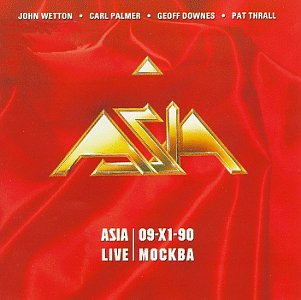
Live in Moscow (1990)

1. Time Again
2. Sole Survivor
3. Don't Cry
4. Geoff Downes Keyboard Solo
5. Only Time Will Tell
6. Rock and Roll Dream
7. Starless
8. Book of Saturday
9. The Smile Has Left Your Eyes
Parts I and II
10.The Heat Goes On
11.Go
12.Heat of the Moment
13.Open Your Eyes
14.Kari-Anne
By 1990, Asia was no longer the chart-topping juggernaut it had been in the early 1980s. Yet even as their popularity waned in the West, the band found an eager audience behind the Iron Curtain. Live in Moscow documents their tour of the Soviet Union, a performance that is as historically curious as it is musically uneven. In the waning days of the Cold War, any Western rock act arriving in Moscow was bound to be received with near-religious enthusiasm. That context—more than the music itself—may be the album’s most enduring significance.
The band’s lineup for this tour featured Pat Thrall on guitar, stepping in after Mandy Meyer’s brief tenure, who himself had replaced founding member Steve Howe. Thrall, though competent, lacked Howe’s signature style and progressive pedigree, and his presence further distanced the group from the qualities that had once made them distinctive. Without Howe’s intricate fretwork and compositional nuance, the sound, though full-bodied, veered closer to arena-rock convention.
The performances here are reasonably solid—tight, professional, and appropriately grandiose. However, the recording is plagued by questionable production decisions, most notably the artificial crowd noise. The mixing of audience reactions is conspicuously unnatural, at times even distracting. Nowhere is this more evident than during the quieter moments of Open Your Eyes, the concert’s finale. The applause and cheers during its introspective interlude feel jarringly out of place, undermining the emotional resonance of the track. One is left to wonder whether there was a real audience at all—or if the producers simply felt compelled to manufacture one.
The setlist, constrained by the band’s modest discography at that point, includes expected fare: highlights from their three albums, a handful of John Wetton’s solo material, and a new track, Kari-Anne, tacked on at the end. Whether Kari-Anne is a studio recording or a heavily overdubbed live track is difficult to discern—another casualty of the album’s murky production.
Despite its flaws, Live in Moscow is not without value. For die-hard Asia fans, it serves as a time capsule of the band’s persistence and global reach. It also captures a unique moment in history, when Western pop culture was cautiously filtering into Soviet life. But musically, the album offers little beyond the expected, and its technical shortcomings prevent it from rising above the level of a passable souvenir.
In summary, Live in Moscow is a document of cultural curiosity more than a triumph of performance. It is listenable, occasionally enjoyable, but ultimately forgettable—a live album that seldom justifies its own existence.
Back To Main Page
Go To Next Review